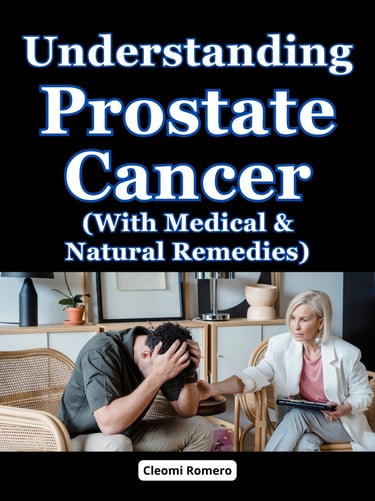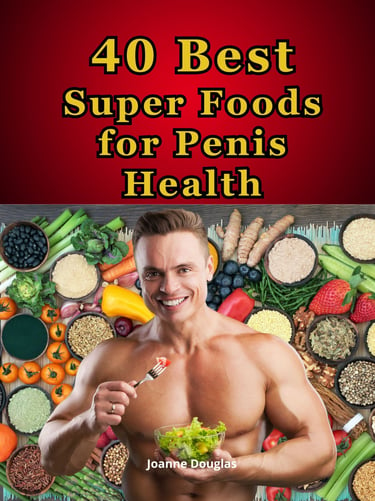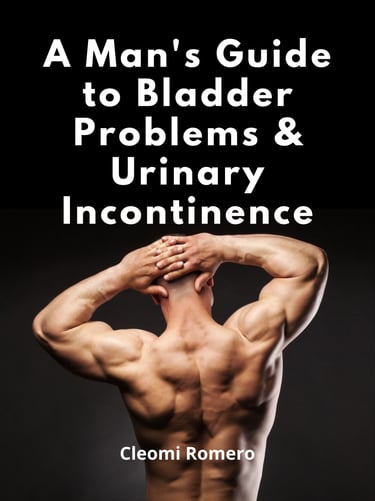The Role of Diet in Prostate Health: Foods to Eat and Avoid
This article discusses some amazing foods that studies have found to be beneficial to prostate health.
HEALTH
8/14/20244 min read
Introduction
Maintaining prostate health is vital for men, especially as they age. One important aspect of prostate health is diet. What you eat can influence the risk of prostate problems, including benign prostatic hyperplasia (BPH) and prostate cancer. By adopting a diet rich in certain nutrients and avoiding others, this can be beneficial for maintaining optimal prostate health.
Foods to Eat for Prostate Health
Here are some beneficial foods that studies have found to be beneficial to prostate health:
1. Fruits and Vegetables: A diet rich in fruits and vegetables is associated with a lower risk of prostate issues. These foods are high in antioxidants, vitamins, and minerals that help combat oxidative stress and inflammation. Cruciferous vegetables like broccoli, cauliflower, and Brussels sprouts are particularly beneficial. They contain compounds such as sulforaphane, which has been shown to have protective effects against prostate cancer (Kaleem et al., 2020).
2. Tomatoes and Lycopene: Tomatoes are rich in lycopene, a powerful antioxidant that may lower the risk of prostate cancer. Studies suggest that lycopene can help reduce the growth of cancer cells and may also protect against other types of cancer (Giovannucci, 2005). Cooking tomatoes increases the bioavailability of lycopene, making tomato sauce and cooked tomatoes excellent choices.
3. Fatty Fish: Fatty fish like salmon, mackerel, and sardines are high in omega-3 fatty acids, which have anti-inflammatory properties. Omega-3s can help reduce inflammation in the prostate and may lower the risk of prostate cancer (Keenan et al., 2007). Including these fish in your diet at least twice a week can provide these beneficial fats.
4. Nuts and Seeds: Nuts and seeds, particularly flaxseeds and walnuts, are rich in alpha-linolenic acid (ALA), another type of omega-3 fatty acid. They also contain antioxidants and fiber, which are beneficial for overall health. Flaxseeds, in particular, have been shown to have a protective effect against prostate cancer (Demark-Wahnefried et al., 2008).
5. Green Tea: Green tea is known for its high levels of polyphenols, especially catechins, which have been shown to have anticancer properties. Regular consumption of green tea has been associated with a reduced risk of prostate cancer and may help in managing prostate health (Hsu et al., 2011).
Disclaimer: The content provided in this article is for information purposes only. The author therefore assumes no responsibility and shall have no liability whatsoever for your use or misuse of the information contained herein, or for any loss, damage or injury to your mental health, physical health, spiritual well-being, emotional health, financial status or in any other way. This article does not recommend that you treat yourself without consultation from a licensed physician, spiritual advisor, mental therapist, or any other licensed professional or counselor as appropriate. Images are courtesy of Canva Pro license subscription via their respective creators on https://www.canva.com
Foods to Avoid for Prostate Health
1. Red and Processed Meats: High consumption of red and processed meats has been linked to an increased risk of prostate cancer. These meats can contain high levels of saturated fats and carcinogens that may promote cancer cell growth (World Cancer Research Fund, 2018). Limiting intake of bacon, sausages, and other processed meats can be beneficial.
2. High-Fat Dairy Products: Dairy products high in saturated fats, such as whole milk and cheese, have been associated with an increased risk of prostate cancer. Opting for low-fat or plant-based alternatives can help reduce this risk (Chavarro et al., 2007).
3. Refined Carbohydrates: Foods high in refined carbohydrates, such as white bread, pastries, and sugary snacks, can contribute to inflammation and obesity, both of which are risk factors for prostate problems. Choosing whole grains and minimizing sugar intake can help manage these risks.
4. Excessive Alcohol: While moderate alcohol consumption might not be harmful, excessive alcohol intake has been linked to an increased risk of prostate cancer. Limiting alcohol to a moderate level—no more than one drink per day—is advisable (Key et al., 2006).
5. Excess Sodium: High sodium intake from processed foods can lead to hypertension and increased risk of prostate issues. Reducing salt and avoiding heavily processed foods can help maintain overall health and reduce the risk of prostate problems.
Conclusion
In conclusion, a diet rich in fruits, vegetables, and healthy fats while avoiding excessive red meats, high-fat dairy, and refined carbohydrates can support prostate health. By making mindful dietary choices, and integrating these dietary recommendations into their daily routine, men can take proactive steps to reduce their risk of prostate problems and enhance their overall well-being.
References (A to Z)
· Chavarro, J. E., et al. (2007). "Dairy products, calcium, and phosphorus and risk of prostate cancer in the Physicians’ Health Study." American Journal of Clinical Nutrition, 85(1), 245-251.
· Demark-Wahnefried, W., et al. (2008). "Flaxseed and prostate cancer: a review of the evidence." Nutrition and Cancer, 60(2), 151-158.
· Giovannucci, E. (2005). "Tomatoes, tomato-based products, lycopene, and cancer: review of the epidemiologic literature." Journal of the National Cancer Institute, 97(6), 313-321.
· Hsu, S., et al. (2011). "Green tea and prostate cancer: a systematic review and meta-analysis." Cancer Epidemiology, Biomarkers & Prevention, 20(4), 693-701.
· Kaleem, M., et al. (2020). "Cruciferous vegetables and cancer prevention: A review of the epidemiological evidence." Journal of Nutritional Biochemistry, 75, 108-118.
· Keenan, T. E., et al. (2007). "Omega-3 fatty acids and prostate cancer: a review of the evidence." Prostate Cancer and Prostatic Diseases, 10(3), 277-282.
· Key, T. J., et al. (2006). "Alcohol and prostate cancer: a meta-analysis." British Journal of Cancer, 94(2), 287-293.
· World Cancer Research Fund. (2018). "Continuous Update Project Report: Diet, Nutrition, Physical Activity and Prostate Cancer." World Cancer Research Fund International.
Click Image to Download
Click Images to Download
If you have questions or concerns, you may contact us at: ebooks@cleomijo.com or use the form below:






